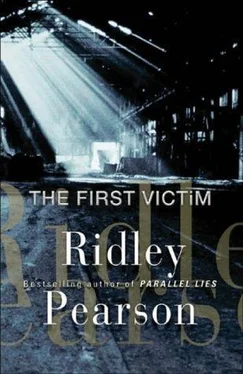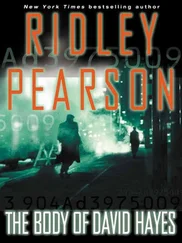Ridley Pearson - The First Victim
Здесь есть возможность читать онлайн «Ridley Pearson - The First Victim» весь текст электронной книги совершенно бесплатно (целиком полную версию без сокращений). В некоторых случаях можно слушать аудио, скачать через торрент в формате fb2 и присутствует краткое содержание. Жанр: Триллер, на английском языке. Описание произведения, (предисловие) а так же отзывы посетителей доступны на портале библиотеки ЛибКат.
- Название:The First Victim
- Автор:
- Жанр:
- Год:неизвестен
- ISBN:нет данных
- Рейтинг книги:3 / 5. Голосов: 1
-
Избранное:Добавить в избранное
- Отзывы:
-
Ваша оценка:
- 60
- 1
- 2
- 3
- 4
- 5
The First Victim: краткое содержание, описание и аннотация
Предлагаем к чтению аннотацию, описание, краткое содержание или предисловие (зависит от того, что написал сам автор книги «The First Victim»). Если вы не нашли необходимую информацию о книге — напишите в комментариях, мы постараемся отыскать её.
The First Victim — читать онлайн бесплатно полную книгу (весь текст) целиком
Ниже представлен текст книги, разбитый по страницам. Система сохранения места последней прочитанной страницы, позволяет с удобством читать онлайн бесплатно книгу «The First Victim», без необходимости каждый раз заново искать на чём Вы остановились. Поставьте закладку, и сможете в любой момент перейти на страницу, на которой закончили чтение.
Интервал:
Закладка:
‘‘We have someone here with us tonight who is very interested in that-a federal agent.’’
‘‘Well, bring him on,’’ the suspect said. ‘‘Let’s talk turkey.’’ He leaned back and kicked his feet up onto the table in a bold and arrogant gesture. Boldt was about to reprimand him for the act when he noticed the bottom of the man’s boots.
Clinging to the rubber between heel and worn-down sole was a small but unmistakable clot of fish scales.
CHAPTER 69
Stevie McNeal’s final chance to find Melissa literally spilled out of her purse as she wrestled for her cellphone in the helicopter’s tight confines and a city bus map fell out onto the clear plastic floor beneath her feet.
‘‘Wait a minute!’’ she’d instructed the pilot, retrieving the map. ‘‘Can you fly this route for me?’’
‘‘We’re low on fuel.’’
‘‘As much as we have time for then,’’ she said. ‘‘This area in particular.’’ She pointed out the area where Coughlie had climbed aboard, distracting her. ‘‘We’re looking for old canneries along here.’’
‘‘Salmon Bay? Once upon a time. Mostly restaurants and boathouses now.’’
‘‘Let’s take a look.’’
The helicopter veered north.
Turning to the technician, Stevie asked, ‘‘These binoculars? They can see heat?’’
‘‘You bet.’’
‘‘Body heat?’’
‘‘That’s the idea,’’ he answered.
‘‘Through a wall?’’
‘‘No way.’’
‘‘A window?’’
‘‘A warm room would mean warm glass, which would produce some degree of green instead of black-so, sure. But it depends.’’
‘‘But people crowded into a room,’’ she suggested, ‘‘big machinery, people sweating.’’
The kid answered, ‘‘We’d get some kind of read on that I suppose.
Listen, I’d rather have that camera that Seven has, but we may have toasted that thing. All we can do is try.’’
At the edge of Lake Union they slowed, passing Fremont Bridge and moving west along the ship canal and into Salmon Bay. Hundreds, if not thousands, of boats of every kind crowded marinas along this stretch. Some of the boats glowed faintly green through the binoculars, holding out hope for Stevie. She trained the lenses onto the roofs and darkened windows of the buildings that lined the south shore of the waterway. The technician used another set of binoculars to view the north shore.
As they passed over a cluster of brick buildings in bad shape, Stevie asked the pilot to make a loop. She was studying those buildings as the kid said from the back, ‘‘Here’s something interesting, but it isn’t a warehouse.’’ He directed her, ‘‘Up about a quarter mile. Your side. Check out the water next to that ship!’’
Dozens of dark shapes. Perhaps forty or fifty boats all tied together haphazardly, side-to-side, bow to stern, unlike any of the marinas they had flown over. She spotted it then-clear out in the group-a glow of electronic green in the water, the binoculars picking up warmth.
The helicopter hovered.
‘‘That’s a lot of heat from below deck,’’ the kid said.
‘‘Where are we? What is that?’’ Stevie asked, pointing out the enormous cluster of shops and boats all tied together.
The pilot informed her, ‘‘They’re the ones confiscated in drug busts and shit like that. The feds auction them off a couple times a year. A lot of ’em never sell. They end up rusting out there. Half of ’em are sinking.’’
‘‘Confiscated?’’ Stevie asked, her skin tingling. ‘‘As in the feds? INS?’’
The pilot said, ‘‘DEA, INS, FBI. Those boats are never going anywhere. They call it the graveyard.’’
Stevie shouted so loudly that both men grabbed for their headphones. ‘‘Get me down! Get me back to the station right now!’’
CHAPTER 70
"I gotta tell ya,’’ LaMoia said to Boldt as both men hurried down the fire stairs at Public Safety two at a time, ‘‘I’m a little pissed at Lofgrin for taking so long with that chain. Seems to me he coulda had something for us this afternoon.’’
‘‘The chain takes a backseat to these fish scales,’’ a winded Boldt said, carrying the evidence bag containing the gang kid’s shoe in his left hand, while guiding himself with the banister in his right. LaMoia was suddenly leaping three stairs at a time. Youth! ‘‘Bernie’s a perfectionist. He isn’t going to speculate. It’s not in his nature. If he’s taking more time with the chain, then maybe that’s in our favor. Maybe he’s got something.’’
‘‘Wouldn’t count on it.’’
In a perfect choreography, LaMoia beat Boldt to the landing and held the door open. Boldt ran through without missing a step.
‘‘Gentlemen!’’ Bernie Lofgrin said, looking up from the middle of his two-million-dollar playground. Two assistants worked at a bench nearby. Lofgrin’s thick glasses leant him the nickname Magoo. He looked extraterrestrial with those eyes and the white lab jacket.
Boldt passed him the evidence bag. ‘‘Need to know if we’re talking the same fish scales, Bernie. We’ve got a live one up in the Box.’’
‘‘A match,’’ LaMoia advised, ‘‘would put him with Jill and Jane Doe.’’
‘‘I get the idea, Sergeant,’’ Lofgrin replied. Detectives tried to influence the lab’s findings by guiding and indicating where they wanted
the evidence to lead. Lofgrin rarely played that game, though detectives never stopped trying.
They gave him the room to work and they kept their mouths shut, with Boldt twice reaching out to stop LaMoia from making any comment. Lofgrin always took his sweet time about it. To rush him was to get him talking; to get him talking was to suffer exasperatingly long explanations on a variety of subjects.
He prepared two fish scales onto a glass slide-one from the earlier evidence, and one from the shoe just delivered. He began speaking before the slide was fully inserted into the microscope. ‘‘Was just about to return your call, Sergeant,’’ he said to LaMoia, though his attention remained on his equipment. ‘‘The reason we took so long on that chain that Dixie sent over was that we lifted a substance from a full third of the links. Ran a gas chromatograph on it-petroleum base-but couldn’t establish a product identification for you. Knew you’d want it.’’
‘‘Oil?’’ LaMoia asked.
‘‘It has the viscosity of old oil, to be sure. Nothing automotive. The graph was a mess of chemicals. Couldn’t get a clean enough sample for a good read. Because of its age maybe. We must have tried a dozen times or more, which accounted for the extra man-hours.’’ He leaned his head into the microscope and made adjustments on the focus. ‘‘Bingo!’’ he said, stepping aside. ‘‘Have a look.’’
LaMoia moved to the microscope. He worked the focus. Nobody’s eyes focused the same as Lofgrin’s. ‘‘That’s a match!’’ he said excitedly. The fish scales tied their suspect to the Hilltop homicides.
‘‘I concur,’’ Lofgrin said.
‘‘The oil,’’ Boldt encouraged. He knew the man well enough to know the importance of this evidence-Bernie Lofgrin always dragged out the really good stuff.
Lofgrin smiled at his old friend, letting Boldt know he was on the right track. ‘‘Grease, actually. Extremely heavy grease, used in winches, lifts. The substance that threw us off was nothing more than sea salt. Contaminated the hell out of our graphs.’’
‘‘Sea salt,’’ Boldt repeated. ‘‘Grease. .’’ he mumbled. ‘‘And the only place we can confirm the use of those chains was in the sweatshop.’’
‘‘Ergo,’’ Lofgrin said in his usual contemptuous tone, ‘‘that sweatshop isn’t in any cannery. It’s on some ship.’’
Читать дальшеИнтервал:
Закладка:
Похожие книги на «The First Victim»
Представляем Вашему вниманию похожие книги на «The First Victim» списком для выбора. Мы отобрали схожую по названию и смыслу литературу в надежде предоставить читателям больше вариантов отыскать новые, интересные, ещё непрочитанные произведения.
Обсуждение, отзывы о книге «The First Victim» и просто собственные мнения читателей. Оставьте ваши комментарии, напишите, что Вы думаете о произведении, его смысле или главных героях. Укажите что конкретно понравилось, а что нет, и почему Вы так считаете.












